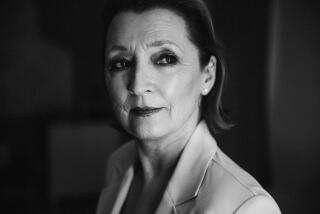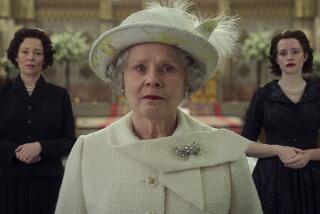Queen, in her infinite variety
- Share via
With last fall’s BBC/PBS “The Virgin Queen” still fading from the retina, it is apparently not a moment too soon for another run through the life of England’s Elizabeth I. This time out, under the auspices of Britain’s Channel 4 and our own HBO, it’s Helen Mirren ascending the throne, following in a line of succession that runs from Sarah Bernhardt to Glenda Jackson to Cate Blanchett, and like Det. Chief Inspector Jane Tennison in Mirren’s “Prime Suspect” series, she is a woman surrounded by men who don’t always take her as seriously as they should.
The four-hour “Elizabeth I” hits the usual tabloid high points of the last half of the 70-year life, but it has its own character, due mostly to Mirren’s regal yet quirky performance and to the production itself -- which being apparently well-researched and true to its time seems all the more fantastical for it.
The actual floor plan of Whitehall Palace was re-created as near as possible (in Lithuania), and there is a sort of subtextual drama that involves the passage of the characters from one room into another, from public to political to private space. As the Steadicam tracks or precedes characters rocketing through this hierarchical maze, talking of policy and governance and gossip, the film plays like nothing so much as a 16th century “The West Wing.”
It’s at its best in these moments, and Elizabeth is most persuasively alive in her scenes with her counselors -- especially Toby Jones (the voice of Dobby the House Elf in the “Harry Potter” movies, you can tell your kids) as Robert Cecil, whom Elizabeth called “Pygmy.” But like many, if not most, if not all Elizabeth films, it concentrates on her peculiar but passionate love life. (She was a kind of celibate coquette, or what we might now call “a tease.”) The problem, here as in other such films, is that the men on whom she lavished her attention were not, as it were, fit for a queen, and these relations, which are based on cycles of transgression and forgiveness, are quickly wearing. Oddly, given her tendency to make bad decisions in her boyfriends’ favor, the film buttresses the old canard about why a woman shouldn’t be president: “She held absolute power over everything ... except her heart” is one of the lines HBO is using to sell it.
In the first half, it’s the Earl of Leicester who has her eye; fellow old pro Jeremy Irons plays him, and he and Mirren do capture the rhythm of people who know each other well and can let their hair down. (The suggestion is that they’re sleeping together in the literal if not the euphemistic sense.) After the earl departs, in a dying flurry of declarations of love, his stepson the Earl of Essex (Hugh Dancy, from “Basic Instinct 2”) steps in. He is a tiresome mix of neurotic infatuation and obstinate self-importance, and good riddance to him when he goes in turn.
Known as “the Virgin Queen” even in her time (the state of Virginia was named for the state of her hymen, and the miniseries pointedly opens on an examination of the royal genitals), Elizabeth was a mix of personas that are understandably hard to untangle 400 years after the fact, and so must be imagined rather than re-created. Here we get her in all her infinite variety: playing the virgin, reading to her ladies-in-waiting, throwing fits, pitching woo, cynical, sentimental, sensible, jealous, hard as nails, soft as down -- she seems an extremely confusing person, and it’s as if Mirren looked at her from every side, and played them all. (A Cubist performance, you might say.) This may, of course, be the intended effect, but it’s also confounding, and the film as a whole is a strange case of mostly excellent parts that make an overlong and tedious whole.
Screenwriter Nigel Williams knows how to hide exposition, and he has written scenes in which his Real People of History interact in recognizably human ways. His dialogue has a nice iambic lilt, as if he had spent awhile buried in Shakespeare before getting out his own quill. (Indeed, the queen paraphrases the Bard -- “Love alters when it alteration finds,” she says, playing off of “Love is not love/Which alters when it alteration finds.”) Like those who have writ before him, he appropriately cribs from history, incorporating passages from Elizabeth’s address to troops who, as events fell out, were not required to defend England against the Spanish Armada, and her valedictory “Golden Speech,” in which she makes clear that her truest love was always England. (Mirren saucily adds a “How’m I doin’?” cocked eyebrow to advisor Cecil.) There is some of the queen’s own actual poetry quoted, too, which shows her to have been a woman like any other beneath her imperial carapace.
*
‘Elizabeth I’
Where: HBO
When: Part I, 8 tonight; Part II, 8 p.m. Monday.
Ratings: TV-MA (may be unsuitable for children under the age of 17)
More to Read
Only good movies
Get the Indie Focus newsletter, Mark Olsen's weekly guide to the world of cinema.
You may occasionally receive promotional content from the Los Angeles Times.











